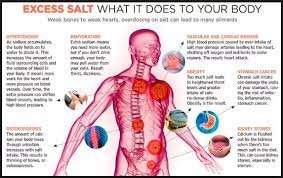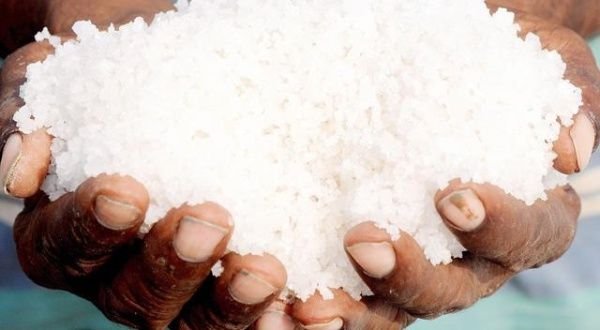
picture source

picture source
It's good to know much about the basics and have fundamental knowledge of the things around you
Salt is made up of around 40% sodium and 60% chloride. It’s commonly used to add flavor to foods or preserve them.
Sodium is a mineral essential for optimal muscle and nerve function. Together with chloride, it also helps your body maintain proper water and mineral balance.
Yet, despite its essential functions, ingesting too much salt can have unpleasant effects, both in the short and long term.
CONSEQUENCES.
Water retention
First, you may notice that you feel more bloated or puffy than usual. This happens because your kidneys wish to maintain a specific sodium-to-water ratio in your body. To do so, they hold on to extra water to compensate for the extra sodium you ate.
This increased water retention may result in swelling, especially in the hands and feet, and can cause you to weigh more than usual.
Rise in blood pressure
A salt-rich meal can also cause a larger blood volume to flow through your blood vessels and arteries. This may result in a temporary rise in blood pressure.
A person’s sensitivity to salt is thought to be influenced by factors like genetics and hormones. Aging and obesity may also amplify the blood pressure-raising effects of high salt diets.
These variables may explain why salt-rich diets don’t automatically result in a rise in blood pressure for everyone.
Intense thirst
Eating a salty meal can also cause you to have a dry mouth or feel very thirsty. Encouraging you to drink is another way in which your body tries to correct the sodium-to-water ratio.
The resulting increase in fluid intake can cause you to urinate more than usual. On the other hand, failing to consume fluids after eating high amounts of salt may cause your body’s sodium levels to rise above a safe level, resulting in a condition known as hypernatremia.
HYPERNATREMIA can cause water to leach out of your cells and into your blood, in an attempt to dilute the excess sodium. If left untreated, this fluid shift can result in confusion, seizures, coma, and even death.
Other symptoms of hypernatremia include restlessness, breathing and sleeping difficulties, and decreased urination (2Trusted Source
Effects of eating too much salt
A sodium-heavy diet makes you retain fluid, which leads to swelling in the short term. But far more concerning is its impact on your body over time. Excess sodium intake can negatively affect your kidney function. It also leads to high blood pressure, the top risk factor for stroke.
SIGNS YOUR SODIUM INTAKE IS TOO HIGH
It’s important to know how sodium affects you, as everyone is different. After eating a salty meal, look for the following signs to see if you’re more sensitive to sodium’s effects.
Bloating
Sodium attracts water. If you eat a lot of salty foods, you’ll experience fluid retention (when sodium holds water in your body). The result? You feel swollen and look puffier, especially around the abdomen and eyes. You may also notice swelling in your hands and feet.
Increased thirst
Recent research shows higher levels of sodium don’t cause people to be thirstier. But despite that, some people can’t help but chug down more liquids after eating salty foods.
AMOUNT OF SALT TO BE CONSUMED
In 2020, the World Health Organization (WHO) recommended that adults consume no more than 5 grams (0.18 oz) (just under a teaspoon) of salt per day, an amount providing about 2 grams (0.071 oz) of sodium per day. The WHO further recommends that salt intake be adjusted for those aged 2 to 15 years old based on their energy requirements relative to those of adults. High sodium consumption (5 g or more of salt per day) and insufficient potassium intake (less than 3.5 grams (0.12 oz) per day) have been linked to high blood pressure and increased risk of heart disease, stroke, and kidney disease.

Picture credit is mine
REFERENCES:
https://www.healthline.com/nutrition/what-happens-if-you-eat-too-much-salt
https://health.clevelandclinic.org/topics/diet-food-fitness/nutrition/
https://en.wikipedia.org/wiki/Health_effects_of_salt?wprov=sfla1